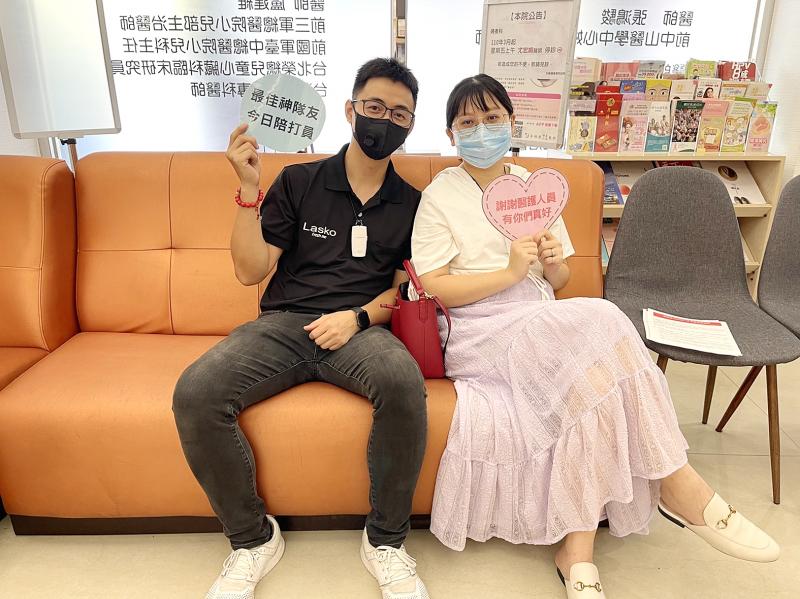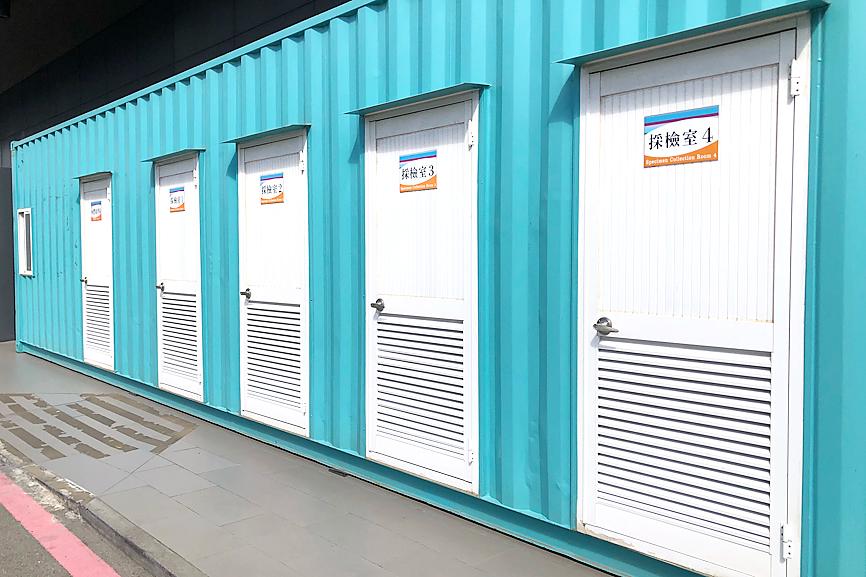Starting today, all arrivals to Taiwan are to be tested three times for COVID-19 before the end of their quarantine period.
The policy is in response to the global spread of the more transmissible SARS-CoV-2 Delta variant, the Central Epidemic Command Center (CECC) said yesterday.
People arriving by airplane or ship after noon today are to be subject to the policy in an effort to reinforce the health monitoring of international arrivals, the center said.

Photo: Ou Su-mei, Taipei Times
Upon arrival at an airport or port, people who have traveled to “key high-risk countries” in the past 14 days would be checked into a government-funded centralized quarantine facility, where they would stay for 14 days, it said.
The arrivals would be given a polymerase chain reaction (PCR) test upon arrival and at the end of their quarantine period, it said.
As an extra precaution, they would be required to take a rapid COVID-19 test using an at-home test kit between days 10 and 12 of their quarantine, it said.

Photo: CNA
The center has listed seven key high-risk countries: Bangladesh, Brazil, India, Indonesia, Israel, Peru and the UK.
Arrivals who have not visited these countries in the past 14 days would also need to take a PCR test upon arrival, it said.
A designated vehicle would then take them to a quarantine hotel or centralized quarantine facility, where they would complete a 14-day quarantine at their expense, it said.
They would take a rapid home test between days 10 and 12 of their quarantine and take another PCR test before the end of the quarantine period, between days 12 and 14, the center said.
Genome sequencing would be performed for all arrivals who test positive, it added.
Experts recommended the change in policy at a meeting yesterday morning, Minister of Health and Welfare Chen Shih-chung (陳時中), who heads the CECC, told a daily news briefing in Taipei.
Previously, when arrivals could quarantine at home, there was the concern that if they had a false negative test result, there would be an increased risk of family members contracting COVID-19, Chen said.
However, all arrivals are now required to stay at a quarantine hotel or centralized quarantine facility, he said.
Also yesterday, the CECC announced that migrant workers employed in residences would once again be allowed to switch employers, effective immediately.
However, while caregivers and domestic workers may transfer to new employers, migrant workers in other industries still cannot, it said.
The new employer would be required to arrange and pay for their employee to receive a PCR test at a healthcare facility on their first day of employment, it said.
Employers who fail to do so would be fined NT$60,000 to NT$300,000 under the Employment Service Act (就業服務法) and no longer be allowed to hire foreign workers, it said.
Brokers acting on behalf of employers who fail to observe the requirement would also be subject to a fine of NT$60,000 to NT$300,000, it added.
Transfers are being reinstated for residence-based migrant workers given an easing in the COVID-19 situation and a continued demand by people with disabilities for caregivers, Deputy Minister of Labor Wang An-pang (王安邦) said.

A Ministry of Foreign Affairs official yesterday said that a delegation that visited China for an APEC meeting did not receive any kind of treatment that downgraded Taiwan’s sovereignty. Department of International Organizations Director-General Jonathan Sun (孫儉元) said that he and a group of ministry officials visited Shenzhen, China, to attend the APEC Informal Senior Officials’ Meeting last month. The trip went “smoothly and safely” for all Taiwanese delegates, as the Chinese side arranged the trip in accordance with long-standing practices, Sun said at the ministry’s weekly briefing. The Taiwanese group did not encounter any political suppression, he said. Sun made the remarks when

The Taiwanese passport ranked 33rd in a global listing of passports by convenience this month, rising three places from last month’s ranking, but matching its position in January last year. The Henley Passport Index, an international ranking of passports by the number of designations its holder can travel to without a visa, showed that the Taiwan passport enables holders to travel to 139 countries and territories without a visa. Singapore’s passport was ranked the most powerful with visa-free access to 192 destinations out of 227, according to the index published on Tuesday by UK-based migration investment consultancy firm Henley and Partners. Japan’s and

BROAD AGREEMENT: The two are nearing a trade deal to reduce Taiwan’s tariff to 15% and a commitment for TSMC to build five more fabs, a ‘New York Times’ report said Taiwan and the US have reached a broad consensus on a trade deal, the Executive Yuan’s Office of Trade Negotiations said yesterday, after a report said that Washington is set to reduce Taiwan’s tariff rate to 15 percent. The New York Times on Monday reported that the two nations are nearing a trade deal to reduce Taiwan’s tariff rate to 15 percent and commit Taiwan Semiconductor Manufacturing Co (TSMC, 台積電) to building at least five more facilities in the US. “The agreement, which has been under negotiation for months, is being legally scrubbed and could be announced this month,” the paper said,

Japan and the Philippines yesterday signed a defense pact that would allow the tax-free provision of ammunition, fuel, food and other necessities when their forces stage joint training to boost deterrence against China’s growing aggression in the region and to bolster their preparation for natural disasters. Japan has faced increasing political, trade and security tensions with China, which was angered by Japanese Prime Minister Sanae Takaichi’s remark that a Chinese attack on Taiwan would be a survival-threatening situation for Japan, triggering a military response. Japan and the Philippines have also had separate territorial conflicts with Beijing in the East and South China